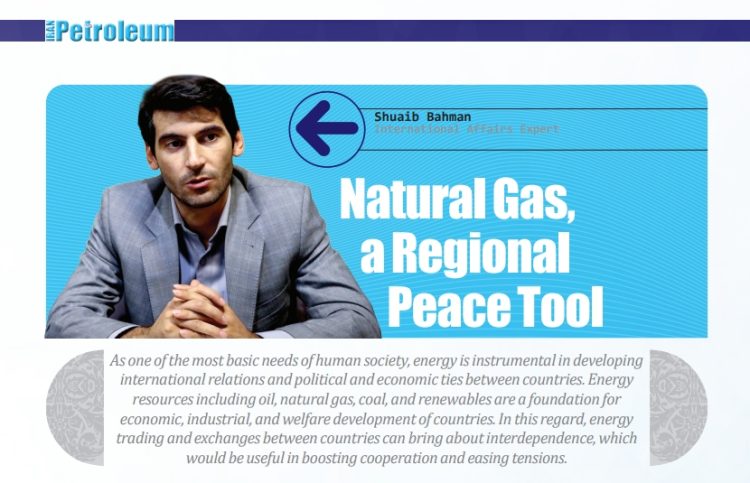As one of the most basic needs of human society, energy is instrumental in developing international relations and political and economic ties between countries. Energy resources including oil, natural gas, coal, and renewables are a foundation for economic, industrial, and welfare development of countries. In this regard, energy trading and exchanges between countries can bring about interdependence, which would be useful in boosting cooperation and easing tensions.
Natural gas, as a strategic source of energy, plays a key role in international relations. It owes its significance not only to economic prosperity and energy supply but also to its potential to establish friendly ties and relax regional tensions.
More specifically, in a complicated and tense region like the Middle East, natural gas can serve as a tool for interdependence and reinforcement of peace. Iran’s neighboring countries, particularly Turkey and Iraq, are cases in point as they have developed ties thanks to Iranian gas imports.
Interdependence Tool
“Interdependence” is a key notion in international policy. It implies a situation where governments or political entities become interdependent due to shared needs and interests. Such dependence is often created in economic, energy, and security domains, leading to détente and increased constructive interaction. Interdependence in the energy sector would mean creating ties between producers/suppliers and consumers of energy to interact and cooperate further, which would finally reduce tensions while bolstering economic and political cooperation between countries.
In this regard, as a vital need of modern economies, energy can be a major factor in bringing about interdependence between states. Energy exporting countries depend on revenue from energy sales, while energy importers heavily depend on sustainable energy supply for economic development and supplying their domestic needs. Such reciprocal need would bring about interdependence, which would in turn give rise to closer economic and political interactions that would clear the way for regional and international peace and stability. Therefore, although political differences may impact these ties, energy interdependence would intervene as a modifier to ease tensions.
As a vital source of income, natural gas would set the foundation for such interdependence. Among gas producers, Iran enjoys a high position thanks to its deposits in place. Therefore, it may benefit from this source for economic and political ties with neighbors. For their part, gas importers would use this opportunity for supplying their energy needs and pave the ground for better diplomatic relations and broader cooperation.
 Gas Supply to Turkey, a Success Story
Gas Supply to Turkey, a Success Story
Iran’s neighbor Turkey heavily depends on importing energy. That represents a case of gas export impact on interdependence. For decades Iran and Turkey have been broadening their economic cooperation through natural gas pipelines. Such economic interaction goes beyond simple trade ties. Iran’s natural gas is a key source of energy supply to Turkey and therefore the two nations’ ties have largely been impacted by energy interactions.
Such economic interdependence has pushed Iran and Turkey to further bolster their ties in the energy sector. As an East-West bridge due to its geopolitical position, Turkey has always sought to maintain a balance in its foreign relations. Iran’s natural gas is not only an economic factor for Turkey, but also a tool for preserving energy security and enhancing political and economic interactions.
Ties with Iraq
Another strategic neighbor of Iran, Iraq also depends largely on importing natural gas from Iran. Given Iraq’s growing demand for electricity, Iran’s natural gas largely helps that country supply its power needs. Owing to such energy interdependence, the two neighboring countries have bolstered their ties in recent years and cleared the way for further cooperation in political and economic domains.
Due to security and infrastructure issues, Iraq is faced with numerous challenges in supplying its energy needs. By supplying gas to Iraq, Iran is playing an important role in developing Iraq’s energy infrastructure. Due to this energy interdependence, Iran and Iraq have bolstered not only their economic cooperation, but also their political and diplomatic ties.
Regional Peace
As an energy supply tool, Natural gas can play a significant role in establishing peace and reducing tensions in the region. By creating mutual interdependence, gas producers and exporters can head off political tensions and differences to clear the way for peaceful interactions.
In the Middle East region where political and military conflicts have been common, energy may be used as a key element for peace and security. As a leading producer of natural gas in the region, Iran can increase gas exports to neighboring countries and bolster regional peace and stability. That would result in stronger economic ties while helping reduce political tensions and upgrading interdependence in the region.
Therefore, natural gas may serve as an effective tool for establishing peace and strengthening friendly ties between nations. Iran’s gas exports to neighboring countries like Turkey and Iraq is a successful instance of such political and economic interactions that would bring about interdependence and bolster international relations. These interactions would in addition to serving economic development help ease tensions and establish peace and security in a tumultuous Middle East region. Using energy potential, particularly natural gas, would offer one of the best solutions for interdependence and enhanced peaceful ties between nations.








